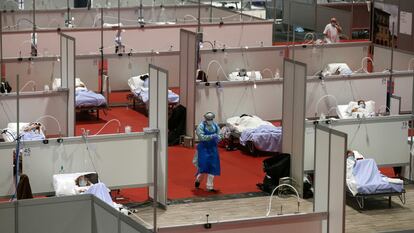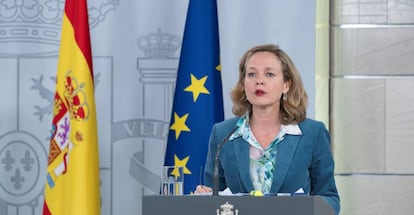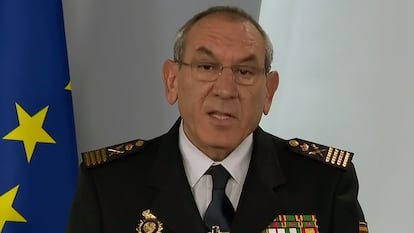Coronavirus cases in Spain now exceed 100,000 with more than 9,000 total deaths
Wednesday marks the fifth day in a row that the number of daily victims has exceeded 800, with a new record of 864 fatalities

Official figures supplied by the Health Ministry on Wednesday put the total number of coronavirus infections in the country at more than 100,000, with 864 deaths recorded in the last 24 hours – the highest figure since the beginning of the outbreak. This is the fifth day running where more than 800 people have died from Covid-19.
Total cases now stand at 102,136, an increase of 7,719 from yesterday. The number of coronavirus fatalities since the crisis began now exceeds 9,000. Around 22,600 patients have recovered from the Covid-19 disease and have been discharged from hospital. Nearly 6,000 patients have required intensive care treatment.
The true number of deaths may be greater, given likely delays in the notification of victims
Tuesday saw the number of daily deaths in Spain reach a new high of 849 people, with the total of fatalities at 8,189. Registered infections rose to 94,417 yesterday. But health professionals have told EL PAÍS that they are confident that the situation in Spanish hospitals was beginning to ease thanks to the confinement measures currently in place.
The growth in the number of deaths each day has slowed, but the curve is yet to be flattened in Spain – and the true number may be greater, given likely delays in the notification of victims.
The numbers do, however, suggest the situation is stabilizing, both in terms of victims and infections. The spike on Tuesday was broadly expected, given reporting delays over the weekend. The day on day increase in deaths in percentage terms related to total cases is now at 10.5% and has been falling since March 25, when the rise was 27%.
The figure for total cases does not provide the whole story in Spain, given that massive testing is still not being carried out, only on those with serious symptoms. But even so, the growth is slowing, with the rise in terms of total cases at 8.1%.
Speaking at the daily government press conference on the coronavirus crisis, María José Sierra from the Health Ministry’s Coordination Center for Health Alerts, said that Spain “was still in the stabilization phase of the pandemic. While this data is positive, our main objective is the patients in the intensive care units.”
The figures of patients in ICUs, she continued, “reflects what happened two to three weeks ago, and we are seeing the numbers we expected. Twenty-two percent of notified cases have been discharged.”
We are now in April, and one day closer to being able to go outsideSpain’s defense chief of staff, Miguel Ángel Villarroya
Spain’s defense chief of staff, Miguel Ángel Villarroya, also spoke at Wednesday’s press conference. “We are now in April, and one day closer to being able to go outside,” he said. He explained that members of the Spanish military were working in 223 different areas, and carrying out disinfections, as well as the transport of cadavers – a total of 109 bodies was taken on Tuesday to the Palacio de Hielo ice rink in Madrid, which is being used as a makeshift morgue.
Villarroya also explained that navy ship Galicia was being prepared as a field hospital, and would be deployed at the North African exclave city of Melilla.
Civil Guard chief José Manuel Santiago reported that there were 27 arrests on Tuesday of people accused of violating Spain’s confinement measures. He also warned of online fraud. “We have detected a regular scam that consists of messages being sent via WhatsApp explaining that cellphone networks are giving away gigabytes of data to customers,” he said. “You should not click on these links. You must be suspicious of information you did not request and report these incidents to the Civil Guard.”
Fernando Simón, the director of the Health Ministry’s Coordination Center for Health Alerts, appeared at the meeting for the second day via video conference, after he tested positive for the coronavirus on Monday. A number of other high-level members of the Technical Committee tasked with combating the epidemic have also been infected.
“I’m doing very well,” Simón said, speaking from his home. “There are a lot of ways of transmitting this virus. On the committee, we have had a lot of activity in recent weeks and that has exposed us to risks. Knowing where the contagion could have happened is not easy. It’s irrelevant whether it happened at La Moncloa [prime ministerial palace], where there are a lot of people without infection.”
Effect on the economy

Speaking on Spanish TV channel Telecinco this morning, Deputy Prime Minister and Economy Minister Nadia Calviño said that a fall in tourism was going to hit the Spanish economy particularly hard. “But elsewhere our economy was growing in a very dynamic manner until the end of February,” she said. “I trust that these foundations will allow us to recover a good pace of growth as soon as possible.”
Speaking to radio station Onda Cero, Calviño also defended the government’s decision not to suspend the collection of taxes such as IRPF income tax. Spain needs this income, she argued, because public costs such as the salaries of health workers and members of the military, all of whom are playing a key role in the fight against the coronavirus, “have not disappeared.”
“This situation is exceptional, but that doesn’t mean that we don’t need income,” she said during the interview. “We cannot abandon the normal working of the public sector.”
Opposition stance
The spokesperson for the Popular Party in the Senate, Javier Maroto, said on Wednesday that the conservative group would support the coalition government’s measures to deal with the coronavirus crisis, but that any plans should first be run by the opposition. Maroto said that the PP “was up to the task” in terms of what citizens were calling for during this “national emergency,” but criticized the steps being taken by the Socialist Party-led administration. The PP was calling, he explained, for “zero taxes” for the self-employed who find themselves in a situation of “zero income,” rather than granting them interest-free loans, as the government announced it would on Tuesday.
On Tuesday, Health Minister Salvador Illa announced that the Cabinet had approved a €300 million payout to Spain’s regions to shore up their health systems. “We will make the details public, but the region that will receive the most money will be Madrid, with €52.7 million, followed by Catalonia, with €51 million, Andalusia, with €44 million, and so on,” he explained. Madrid and Catalonia have been hardest hit so far by the coronavirus epidemic. The funds are being assigned on the basis of the number of patients, occupation levels of intensive care units, and total cases.
Infections among police chiefs

It emerged on Tuesday that the joint operational director of Spain’s National Police force, José Ángel González, had tested positive for the Covid-19 disease. González is in charge of the day-to-day operations of the force, and was taking part in the daily government press conferences on the coronavirus crisis from La Moncloa palace. Confirmation of his infection followed that of Fernando Simón, one of the most visible faces of the Spanish government during the crisis, and that of Laurentino Ceña, the joint operation director of the Civil Guard. González told EL PAÍS that he was doing well, but that would be staying at home in isolation, as Simón and Ceña are also doing.
Tuesday also saw the first death among Spain’s armed forces due to Covid-19. A second lieutenant from the Spanish Air Force, aged 58, passed away in the Gómez Ulla military hospital in Madrid.
Donations from business leader
Amancio Ortega, the founder of Spanish fashion giant Inditex, which owns brands such as Zara and Bershka, has purchased medical material worth €63 million to assist in the fight against the coronavirus. The Amancio Ortega Foundation reported on Tuesday that it was acquiring 1,450 respirators, three million masks for health workers, a million testing kits and other hospital equipment, including 450 beds.
Tourist rentals
Around 36 residents associations have called on the government to close down tourist apartments during the coronavirus crisis, on the basis that they believe them to be “a source of expansion of the Covid-19 health risk during the state of alarm.” The federations and associations are calling for access to platforms such as Niumba, Airbnb and Booking to be blocked while the confinement measures are in place.
With reporting from Pablo Linde.
English version by Simon Hunter.
Tu suscripción se está usando en otro dispositivo
¿Quieres añadir otro usuario a tu suscripción?
Si continúas leyendo en este dispositivo, no se podrá leer en el otro.
FlechaTu suscripción se está usando en otro dispositivo y solo puedes acceder a EL PAÍS desde un dispositivo a la vez.
Si quieres compartir tu cuenta, cambia tu suscripción a la modalidad Premium, así podrás añadir otro usuario. Cada uno accederá con su propia cuenta de email, lo que os permitirá personalizar vuestra experiencia en EL PAÍS.
¿Tienes una suscripción de empresa? Accede aquí para contratar más cuentas.
En el caso de no saber quién está usando tu cuenta, te recomendamos cambiar tu contraseña aquí.
Si decides continuar compartiendo tu cuenta, este mensaje se mostrará en tu dispositivo y en el de la otra persona que está usando tu cuenta de forma indefinida, afectando a tu experiencia de lectura. Puedes consultar aquí los términos y condiciones de la suscripción digital.









































